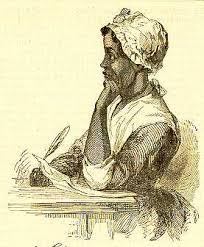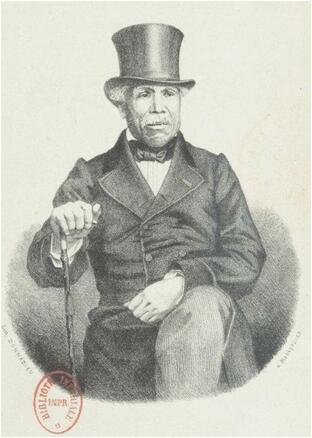|
Born in the Senegal or Gambia area on the West coast of Africa in 1753 Phillis Wheatley was captured by slave traders at the age of seven, and her life would never be the same. She was brought to America and sold to the Wheatley plantation in Boston, Massachusetts 1761; consequently she was given the name Phillis after the ship that brought her to the U.S. Phillis was the personal servant to Mr. Wheatley’s wife but unlike the ordinary slave she was educated by the Wheatley’s. Specifically Mary Wheatley the daughter of Mr. Wheatley taught Phillis how to read and write in English shortly after she was reading the Bible and writing poetry. She studied the poetry of Alexander Pope and also learned Latin, French, Astronomy and biology. Her academic success was unthinkable for a slave girl and even uncommon for a young white boy. Because she was so eloquent in her words she was used as the Wheatley’s entertainment when they would have guest in their home. She was often isolated from the other slaves on the plantation, she was given some privilege but was always reminded that she was a slave. Phillis was a young black slave girl living in a white world where she was intellectually superior to her white counterparts but she could never show it. Around the age of thirteen or fourteen Phillis published her first poem which debuted in the Newport Mercury News Paper. With the help of the English Countess of Huntingdon Phillis was able to publish her first book of poems titled, Poems on Various Subjects, Religious and Moral. Her publication made her the first African-American slave and African-American women to publish a book of poems. Phillis’ poetic style was a mixture of elegaic poetry and short epic style, it was also influenced by Alexander Pope and Thomas Gray. In 1775 Phillis Wheatley became a household name in the U.S. ad England when she wrote a poem praising George Washington and his leadership abilities. A year later when Washington was President of the United States Phillis accepted an invitation to visit the President in Cambridge, Massachusetts. Phillis showed her admiration for Washington through her writings, but she still felt that slavery was inhumane and unnecessary. She would travel to London, England as a way to help promote her poems since she was able to grow a following in England. While working in London Phillis would receive medical treatment for medical issues she battled for a while. Upon returning home in 1778 Phillis would learn that her master John Wheatley died along with his wife and she was no longer a slave. Later in 1778 she would marry John Peters and the couple would fight adversity throughout their marriage. All three of their children died at birth and Phillis found it difficult to find a publisher for her writings. She would work as a maid in a boarding house as she and her husband worked to survive their impoverished conditions. December 5, 1784 Phillis died helping to set the literary foundation future African-American for writers, men and women. Phillis was able to accomplish most of her literary feats as a slave girl, even though she gained her freedom race once again made life difficult for her. She capitalized upon an opportunity to learn and she managed to make history in doing so. During a time where the average black person in America was killed for wanting to learn to read, Phillis Wheatley was breaking literary barriers and making the world take notice. She is an inspiration to black writers around the globe, young and old. Miss. Phillis Wheatley we proudly stand on your shoulders. J.A. Ward. References:
https://www.nwhm.org/education-resources/biography/biographies/phillis-wheatley/ http://www.vcu.edu/engweb/webtexts/Wheatley/philbio.htm http://www.biography.com/people/phillis-wheatley-9528784#later-life
0 Comments
In 1785 the tiny nation of Haiti produced one of the world’s greatest swordsmen Jean-Louis Michel. As a young boy Jean-Louis witnessed Toussaint L’Ouverture lead the Haitian army against the French in the Haitian Revolution. Because of the revolution many mulatto Haitian’s migrated to France; at the age of ten Jean-Louis immigrated to France along with a number of others. There we would enroll into Military School which would help change his life. He was not welcomed well by the other students because of his appearance and especially his dark hue. His peers taunted him daily but his will was too strong to be broken, he used the insults as motivation to become as great as he could be. He learned to channel his anger by taking up the sport of fencing. Jean-Louis spent hours memorizing the fencing techniques the schools Fencing Master taught other students. After classes he would practice each technique until he mastered each move. His skill and determination was eventually noticed by the Fencing Master which would lead to Jean-Louis becoming one of the master’s students. Because of the guidance of the Fencing Master Jean-Louis quickly became the top fencing student in the class. Later he would appear in front of a board of Fencing Masters who would grade him as he took his examination to become a fencing master. He passed his examination with flying colors and became the youngest person ever to gain the title of Fencing Master. The legend of Jean-Louis would grow as he spent time in Napoleon’s Army, he was known for leading the charge against their enemies. Over the course of 30 battles Jean-Louis helped the French army secure victories, because of his efforts he was promoted to “Tambour Major.” One day Jean-Louis was practicing his fencing with his fellow soldiers a jealous soldiers insulted, undermined and discounted Jean-Louis’ fencing skills. The soldier even went as far as calling Jean-Louis racial slurs in an attempt to provoke a dual. Jean-Louis accepted the challenge but only used his practice sword because he did not want to kill the arrogant soldier. Jean-Louis toyed with the man as he attempted to attack him, the soldier eventually wore himself out then Jean-Louis ended the dual with a quick strike across the soldiers face. News of the dual spread and Jean-Louis’ opponent was forced to enter into the public with the mark of defeat upon his face. The French Army was in Spain on a mission and they continuously battled with the Italian soldiers who they were in aligned with. To settle the battles 15 of the best Fencing Masters were forced to duel to settle the quarrels and to earn bragging rights. Jean-Louis was first up to duel with Giacomo Ferrari an Italian soldier. Jean-Louis quickly ended the duel with a thrust to the shoulder and a thrust to the heart. He then defeated 13 other opponents with only 27 strokes of his sword making him the victor of the tournament. Because of his victory the French and the Italian soldiers stopped their quarrels and began to work together again. Jean-Louis was only 29 years old but he was regarded as the greatest swordsman in the land. He was awarded the “Medaille de St. Helene,” a medal Napoleon only gave to his best and most loyal soldiers. He would eventually retire from fencing and take up referring fencing matches to help mend broken relationships between combatants. In 1830 he would open one of the most respected and sought after fencing academies in Montpellier, France. Early in 1865 Jaen-Louis became blind because of cataracts and his wife also died. Later in November of 1865 Jean-Louis passed away leaving a tremendous legacy no man could ever match. Fencing is not something we think of when we think about people of African descent, but as we dig further into our past we learn that fencing is just another thing black people have mastered. Jean-Louis Michel, we proudly stand on your shoulders. J.A. Ward. |
Details
Categories
All
Click Here to join our mailing list
|
Contact Us: |
Connect With Us |
Site powered by PIT Web Design



 RSS Feed
RSS Feed



